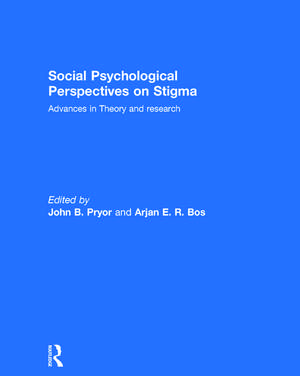Social Psychological Perspectives on Stigma: Advances in Theory and Research
Editat de John B. Pryor, Arjan E. R. Bosen Limba Engleză Hardback – 30 oct 2013
This book was originally published as a special issue of Basic and Applied Social Psychology.
| Toate formatele și edițiile | Preț | Express |
|---|---|---|
| Paperback (1) | 256.87 lei 43-57 zile | |
| Taylor & Francis – 14 oct 2024 | 256.87 lei 43-57 zile | |
| Hardback (1) | 527.40 lei 43-57 zile | |
| Taylor & Francis – 30 oct 2013 | 527.40 lei 43-57 zile |
Preț: 527.40 lei
Preț vechi: 719.97 lei
-27% Nou
100.92€ • 105.63$ • 83.100£
Carte tipărită la comandă
Livrare economică 31 martie-14 aprilie
Specificații
ISBN-10: 0415719860
Pagini: 162
Dimensiuni: 219 x 276 x 18 mm
Greutate: 0.6 kg
Ediția:New.
Editura: Taylor & Francis
Colecția Routledge
Locul publicării:Oxford, United Kingdom
Public țintă
Academic, Postgraduate, Professional, and UndergraduateCuprins
Stigma: Advances in Theory and Research Arjan E. R. Bos, John B. Pryor, Glenn D. Reeder, and Sarah E. Stutterheim 1. A New Stigmatized Identity? Comparisons of a "Food Addict" Label With Other Stigmatized Health Conditions Jenny A. DePierre, Rebecca M. Puhl, and Joerg Luedicke 2. Stigmatization, Repair, or Undesirable Side Effect of Tolerance? Being Clear About What We Study and Target for Intervention Anton J. M. Dijker 3. Belittled, Avoided, Ignored, Denied: Assessing Forms and Consequences of Stigma Experiences of People With Mental Illness Marie Ilic, Jost Reinecke, Gerd Bohner, Hans-Onno Röttgers, Thomas Beblo, Martin Driessen, Ulrich Frommberger, and Patrick William Corrigan 4. Stigma and Psychological Distress in People With HIV/AIDS Gregory M. Herek, Sona Saha, and Jeffrey Burack 5. Turning Our Attention to Stigma: An Objective Self-Awareness Analysis of Stigma and Its Consequences Elizabeth C. Pinel and Jennifer K. Bosson 6. Motivation for Education and Work in Young Muslim Women: The Importance of Value for Ingroup Domains Colette Van Laar, Belle Derks, and Naomi Ellemers 7. "Discredited" Versus "Discreditable": Understanding How Shared and Unique Stigma Mechanisms Affect Psychological and Physical Health Disparities Stephenie R. Chaudoir, Valerie A. Earnshaw, and Stephanie Andel 8. When Stigma-by-Association Threatens, Self-Esteem Helps: Self-Esteem Protects Volunteers in Stigmatizing Contexts Patrick C. Dwyer, Mark Snyder, and Allen M. Omoto 9. Cultural Differences in Targets of Stigmatization Between Individual- and Group-Oriented Cultures Hyeyoung Shin, John F. Dovidio, and Jaime L. Napier 10. The Intimate Partner Violence Stigmatization Model and Barriers to Help Seeking Nicole M. Overstreet and Diane M. Quinn 11. "Don’t Stigmatize": The Ironic Effects of Equal Opportunity Guidelines in Interviews Juan M. Madera and Michelle R. Hebl 12. Erasing the Stigma: Where Science Meets Advocacy Patrick W. Corrigan and Kristin A. Kosyluk 13. A Peek Inside the Targets’ Toolbox: How Stigmatized Targets Deflect Discrimination by Invoking a Common Identity Toni Schmader, Alyssa Croft, Jessica Whitehead, and Jeff Stone
Notă biografică
John B. Pryor is a Distinguished Professor of Psychology at Illinois State University, Normal, Illinois, USA. He has been a contributor to the research literature on social stigma for 25 years. As a social psychologist, Dr. Pryor has examined many of the basic psychological processes that contribute to stigmatization. His research spans a variety of stigmatizing conditions including HIV, weight status, mental illness, racial status, and a variety of others.
Arjan E. R. Bos is an Associate Professor in Clinical Psychology at Open University, Heerlen, The Netherlands. Some of Dr. Bos’ principal research interests concern stigma reduction strategies and the impact of social stigma on psychological well-being of stigmatized individuals.
Descriere
The year 2013 marks the 50th anniversary of the publication Erving Goffman's landmark work, Stigma: Notes on the Management of Spoiled Identity. Through this edited volume, we commemorate the continuing contribution of Goffman's work on stigma to social psychology. As Goffman originally used the term, stigma implies some sort of negative deviance, or in his words, ‘an undesired differentness from what we had anticipated.’ Since Goffman’s pioneering treatise, there have been thousands of articles published on different aspects of stigma. The accelerating volume of articles is testimony to the growing importance of stigma research, with almost three out of four of the stigma-related publications in the research literature appearing in the last 10 years. In this volume, a collection of up-and-coming and seasoned stigma researchers provide both theoretical insights and new empirical findings. The volume should be of interest to both established researchers and advanced students seeking to learn more about the depth and breadth of stigma research.
This book was originally published as a special issue of Basic and Applied Social Psychology.











